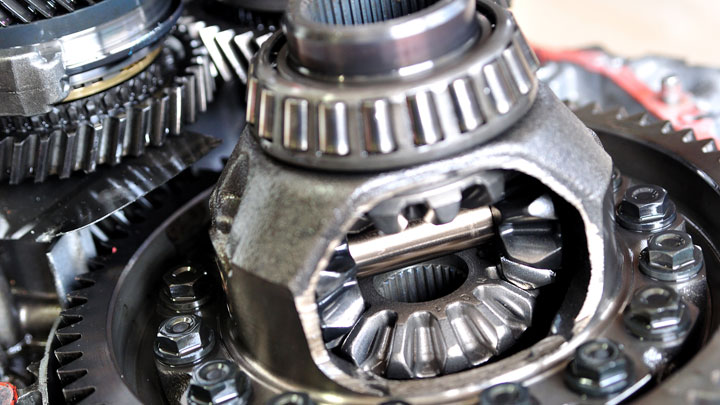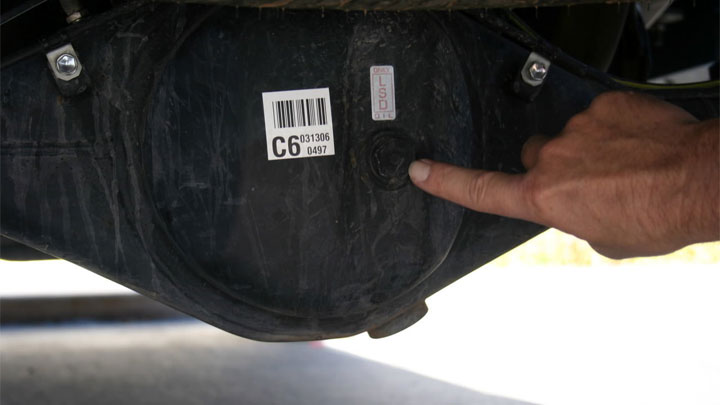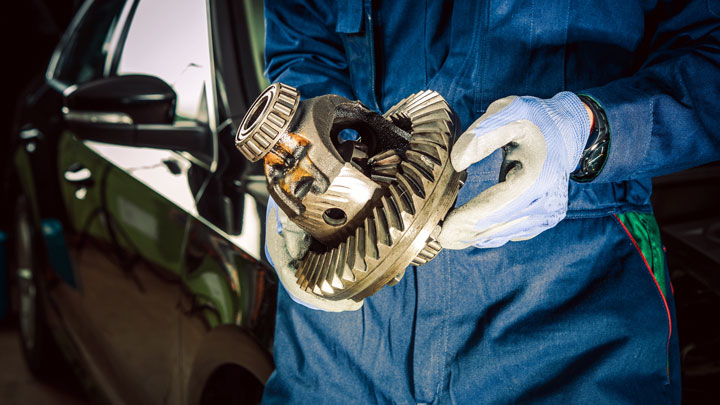Average Front and Rear Differential Repair Cost
A vehicle’s differential (or diff), whether front (FWD), rear (RWD), or both (AWD and 4WD), helps deliver power to the axle(s) and regulates how fast each wheel rotates. Like any other component of a drivetrain, differential problems may arise over time.
Because the issues can be anything from replacing a seal to a complete rebuild or replacement, differential repair costs can vary greatly. Read on to find some average prices for front and rear differential repair, rebuild, and replacement costs.
What is a Differential?
A differential is a mechanical device that allows a variance in wheel speed between wheels on a single axle. When you go around a turn, one wheel travels a shorter path than the other. If it weren’t for the differential, the tires on the driven wheels would want to scrub or skip as each tire tries to “meet in the middle” to match the rotation speed of the other.
Differentials are found in all cars. Depending on engine placement and how many wheels are driven, the differential can be found on the front axle, the rear axle, or both. Sometimes all wheel drive (AWD) vehicles have a center differential which allows the tires on the front and rear axles to spin independently of each other.
On a transverse mounted engine, front differentials are typically integrated into the transaxle. A transaxle is a compact unit consisting of the transmission, differential, and axles. If you have a transaxle and a rear differential, the rear differential likely uses a different type of gear oil.
Some vehicles (notably Subarus) will integrate the transmission, front, and center differentials all into a single unit.
Usually, when a vehicle has a front differential with a built-in transaxle, it will require a fully synthetic oil (SAE 75 to 85, for instance). Transmissions typically require a slightly thinner oil than rear differentials, which need a thicker oil that’s around SAE 90. This will of course will vary depending on each vehicle manufacturer’s specific implementation.
Average Differential Repair Cost

The repair costs of the front and rear differentials will fluctuate based upon the repairs that are needed. Sometimes you may only have to adjust the backlash or replace the oil seal of the differential. These are light repair jobs that will cost between $200 to $400, depending on the make and model of your vehicle.
But if you have more extensive damage to your differential that requires it to be dismantled or overhauled, then you are looking at about $400 to $800 in repair costs. However, these costs are only associated with vehicles that are front engine with rear wheel drive (FR) type.
If you drive a vehicle that is front engine with front wheel drive (FF) type, then the repair costs of the diff will likely be more expensive because the transaxle has to be pulled down and dismantled first.
This takes more time for the mechanics to do which means the hourly labor costs (typically around $85/hour) are going to add up fast. On average, replacing a front differential is about a 3 hour job plus the cost of parts of course. More advanced types of differentials will also affect price.
See Also: Average Differential Replacement Cost
Differential Maintenance Tips

The trick to keeping your differential working smoothly is lubrication. You need to change differential fluid regularly so check your car manual to see what the recommended differential fluid change interval is.
The differential gear needs to be lubricated consistently or else the car will not drive or turn properly. Two of the most common causes of differential damage is due to lack of fluid or fluid that hasn’t been changed in a long time and is past its lifespan.
Therefore, you need to ensure that your differential fluid/oil is in good condition and is filled to capacity according to what the manufacturer recommends to keep the differential in good working order.
With all the friction that occurs in the differential gears, it is very easy for the gears to overheat. Good quality differential fluid will prevent the gears from burning and getting worn out.
You’ll know when you need to replace the differential fluid because you will start to hear a humming noise coming from the differential side. You may even experience vibrations, fluid leaks, and even some strange noises as the symptoms get worse.
How to Check Differential Fluid Condition
It’s simple and should only take about 10 minutes. Just open the filler plug, then put your finger on the hole filler and then you can see the fluid level and its condition.
And to make it even clearer, briefly open the drain plug so a bit of fluid comes out into a small tray. If fluid doesn’t come out, the level is too low and more fluid should be added.
- Replace the Engine or Replace the Car? (11 Factors to Consider) - Apr 11, 2024
- Plastic Piece Dragging Under Your Car? (What It Is and What To Do) - Mar 21, 2024
- Timing Belt vs Timing Chain (What’s the Difference?) - Feb 27, 2024


2006 F150 XLT
When I decelerate from 40mph, I hear a grumbling sound from the rear end (like big rocks clunking around in a cement mixer) at around 35mph all the way to just before stopping (maybe 5mph). There’s no unusual noise from a start and accelerating to cruising speed, just at deceleration. No screeching or squealing sounds, no jerking, and no excessive tire wear.
Does this sound like a differential problem?
Yeah, sounds like it might be. I would get that checked out soon. The diff could seize if there are loose chunks of metal flying around in the housing.
I have a loud clunk at 1st and 2nd gear on my Manual Hummer H3.
I check under the H3 and notice the front shaft from transfer case to front axle is loose. And if I try to turn it hard, I can hear the clunk or metal with metal.
Don’t know if is only the front Axle Pinion Shaft issue or can be the transfer case that cause my shaft bushing and my Axle to fail.
Need help. Please.
Getting a popping noise from my rear axel in my 14 ram 1500 when making u turns I know the rear has to be damaged what am I looking at for a rebuild and or fixing whats broke
That depends on what’s wrong. Have you had the problem diagnosed by a mechanic?
Hi, I have a 09 4×4 Silverado. It started doing this hum type noise, narrowed it down to the rear. I’m told could be pinion bearing in my differential, another said it could be my transfercase. I bought it used with 70k miles on it, I don’t drive much so it’s just now 116k miles after owning it 4 years. I’ve never checked or serviced either parts, I’m 58 years old disabled mom. On SSI I can’t afford an expensive fix, and I’m lucky with problems no one can figure out. On YouTube there’s a video of a vlog named Eric the car guy, his dad’s Silverado had the same noise. Took him a long time and parts to figure out where exactly the noise is coming from, turned out it was the pinion pressure was off. But he put in a new gear set anyway, the noise went away. No codes are coming up, no other noises no leaks . So, what are my odds it’s the pinion bearing ? What should that cost on average? Thank you
Eric the Car Guy is great. If the noise is the same, you may have the same issue. Hard to say for sure until a mechanic takes a look at it.
I don’t know how much it will cost to fix. If you get a used differential it could be around $400 from a salvage yard but it can go up from there depending on what exactly the problem is.
I have a 2015 4WD Ram 1500, and was quoted $3,175 to replace the front differential from the dealer. Is this too high? Considering a quote from an independent shop, but would require a long haul back and forth. Thanks in advance!
That does seem high, but plausible since they are using OEM parts. An independent shop could probably do it cheaper.
I have an 06 Toyota tundra. Previous owner replaced the gears in the rear differential with 456 gears. I have the parts to do the front in order for 4×4 to be in sync. House much should I expect to pay?
I don’t know exactly, but it won’t be cheap. Expect to pay around $1,000.
my partner has a jeep grand cherkoke 2003 model, have done the swing arms but centre differenital is gone, how much to fix
I’d call a few shops around your area to see what they quote you. I am not sure.
Good morning my Dodge Chevy Grand Caravan 2008 3.3 with 104000 MI recently got a oil change and it was discovered that the front differenitial, transfer case , U-joints, Rear Differential and Axle boot on the passenger side torn & it’s saying not applicable. What does that actually mean do I have to repair ,replace? How much I’m looking at?
I have a 2012 Buick LaCrosse 3.6L VVT Vin. 3 FWD Engine, and when I drive at cruising speeds of 35-45mph and/or 1500rpms, I feel a vibration in my gas pedal. But when I drive on the highway at speeds of 55-65mph, I don’t feel it at all [I am slightly above 1500rpms].
In order to stop the vibration[s] at cruising speeds, I depress the gas pedal, then repress down harder to get the car above 1500rpms. On local roads, I have to do this constantly, but on highways, not at all.
Any ideas where to start looking? Differential? Tranny? Gas Pedal Sensor?
Any and all help/ideas would be greatly appreciated.
Thank you.
Since your vehicle is FWD, the transmission and differential are part of a single unit called the transaxle. It’s hard to tell from the description where the vibration is coming from, so I recommend having a mechanic inspect your vehicle in person for an accurate diagnosis.
I drive a 2014 Ford Mustang and recently noticed some play in one of my rear wheels when I pull on it and then push it back in. Even with the nuts tightened, and the car on the ground. It also is making a metal to metal noise as i go over speed bumps. Do you have any advice on which part could be out?
I took my Isuzu 4X4 DTEQ for a service. Right after the service an oil leak developed on the front left side differential seal. The mechanic said that he had topped it up & was because it was low the oil seal was already damaged. But there was never any sign of an oil leak before. Can a seal get damaged because of too much oil put in which could put to much pressure in the differential.
Is replacement of Rear pinion seal on a 2010 RAV 4 supposed to cost over $400?
I have a 2014 Nissan Pathfinder. The dealership is quoting me $5516 for the parts and labor for repairs. Does this sound reasonable for the make, model, and year of the vehicle?
That sounds high but I’d recommend getting another quote from an independent shop.
I have a 2007 Infiniti M35. I hear a grinding sound that’s coming from the driver side. I hear this noise when I’m making a right turn or when I punch the gas to accelerate fast I hear the same grinding sound. I changed the driver side wheel bearings. The noise is still there
Could be an issue with the CV joint on that side.
I have a 2009 rav 4 all wheel drive. It is making a high pitch metal on metal sound. I have been told I need to replace? No one mention checking the fluid. Cost can be up to or over 900. But currently part is on back order. Can the fluid be checked.
I have a ’99 Ford Explorer. All of a sudden a few weeks ago it started this horrible clunking/grinding when I turn left or right tight like into a parking spot. A mechanic test drove it and said my front differential is shot, $5,000 to fix!! Of course, my suv isn’t worth that much. I’m on social security, can’t really afford to fix that or buy another. What do you think, does this sound right? What would you do?
I’d recommend getting another quote from an independent shop, not dealership. Rebuilding or replacing with a used differential should be much cheaper, possibly under $1k.
I’m leasing a 2018 Honda CR-V and recently reached 19,500 miles and was told I had to pay for rear 4w differential service when I brought it to dealership for oil change. Shouldn’t this happen when it has more milage? Feel I’m getting ripped off!
Your CR-V actually has a 15k-18k mile rear diff fluid change recommended service. It’s a quick job so it shouldn’t cost too much. After this one, the next change interval is much farther out.
How much would it run me to replace an axle on 1996 Ford RV George boy make
I have a 1964 gto that has a grinding sound coming from the rear differential. When I test drove it, I didn’t hear that sound. Now that it’s been delivered to my location from a different state I can hear this sound. I’m going to check the fluid level today and see it it’s just low in fluid. What do you think?
I have a 2000 ford explorer eddie bauer. front and rear differantial very loud.200,225 thousand miles. was told beerings would be 1500-2000. do i put more money in.can i buy a reasonalablre car for 2000 ?
That’s a tough one. I’d have a really hard time sinking that much into a vehicle with that many miles (unless it’s already had major parts replaced). I’d recommend getting a couple different estimates before deciding as the price seems a bit high.
I don’t know were you are located but I do that kind of job for like $275 to $350 any day of the week!
Hi Eric. Are you local in Philadelphia. I believe I need oil and/or differential reolaced.. let me know or call get in touch
Are you in Phoenix area?
If so I need a front differential replaced on 2011 suburban LTZ
Have already replaced engine and transmission in the last two years so after $10000 on those two I hate to put more money in but I think it’s a good enough vehicle to do it
Thank you
I have a whistling sound coming from the front when I drive between 20-25 mph. could that be coming from the front differential?
Whistling sounds from the engine area are usually from a vacuum leak due to a worn or cracked hose. A pulley or belt could also be the cause.
I need a front differential on a 2008 a5 Quattro coupe, and I want a reputable shop near me, 620 Tailgate Terrace Hyattsville Md
Hello I have a 2005 Chevy Tahoe that’s humming real loud and scrubbing they saying my rear end is gone I put lubricant in it its still doing the same thing and its loud what do I do
There is no leaks nor there is no sounds coming from the vehicle while driving. The only thing is that the light keeps flashing. I don’t know what to do???
Why noise come from drive head if there is dent on pinion or ring gear teeth??
So i went to a shop to change breake pads and rotors but it was still squeaking. So the mechanic checked my rear drum brakes and said both sides where leaking and was called the differencial seal? Should i replace the entire axel or just repair the seal?
Just replace seal
Hello I took my 2012 ram 1500 to a mechanic shop and they said that the pinion bearing need to be replaced all 6 of them and that it would cost 1400 canadian $$ so about 1100 American $$ does that sound right …I am hearing a whirl deep sound when I let of the gas pedal
That sounds about right.